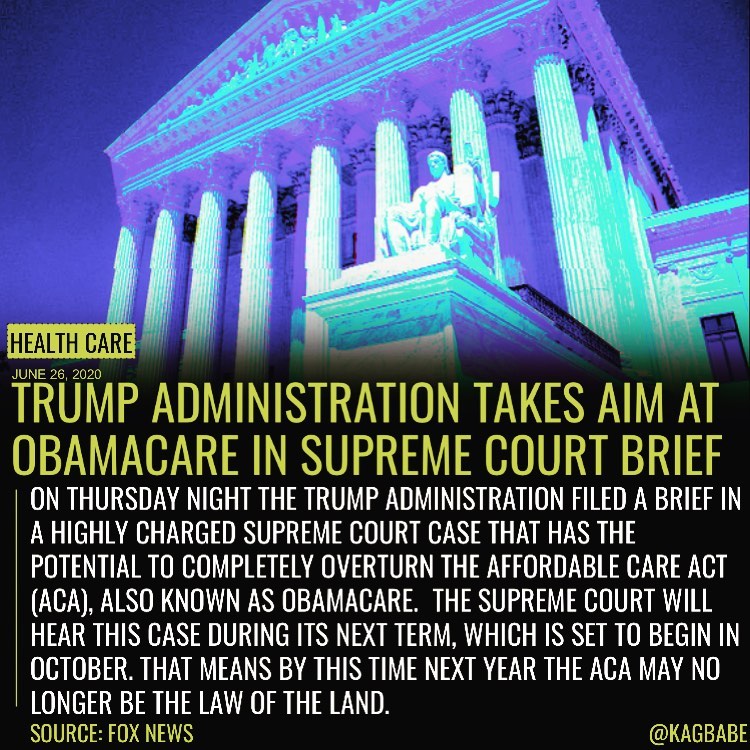
The case, California v. Texas, is brought by a group of red states arguing that because Congress eliminated the financial penalty associated with the individual mandate — the provision in the ACA that requires all Americans to purchase health insurance — it is no longer a valid exercise of the government’s power to tax and therefore is unconstitutional.
The Supreme Court reading the mandate as a tax is what saved the law during a previous challenge, enraging conservatives who thought the Republican-appointed majority on the court would strike down the ACA. The red states further argue that the individual mandate is not “severable” from the rest of the law, meaning it was so instrumental to Congress’ plan when it originally passed the legislation that the rest of the law also needs to be declared invalid if the Supreme Court rules the individual mandate is unconstitutional. The Trump administration in its brief supported that position. “The individual mandate cannot be severed from the remainder of the ACA. Congressional findings incorporated into the ACA’s text clearly indicate that Congress would not have adopted the guaranteed-issue and community-rating provisions absent the individual mandate’s requirement to purchase insurance,” the Trump administration argues.
It continues: “This Court recognized the interrelatedness of these three provisions in [two other cases]. And Congress’s 2017 amendment does not alter the severability analysis because it left intact the critical statutory findings about the interconnectedness of these provisions — findings that were and remain the functional equivalent of an inseverability clause.” The Supreme Court will hear this case during its next term, which is set to begin in October. That means by this time next year the ACA may no longer be the law of the land.
CTD ⬇️
The Supreme Court reading the mandate as a tax is what saved the law during a previous challenge, enraging conservatives who thought the Republican-appointed majority on the court would strike down the ACA. The red states further argue that the individual mandate is not “severable” from the rest of the law, meaning it was so instrumental to Congress’ plan when it originally passed the legislation that the rest of the law also needs to be declared invalid if the Supreme Court rules the individual mandate is unconstitutional. The Trump administration in its brief supported that position. “The individual mandate cannot be severed from the remainder of the ACA. Congressional findings incorporated into the ACA’s text clearly indicate that Congress would not have adopted the guaranteed-issue and community-rating provisions absent the individual mandate’s requirement to purchase insurance,” the Trump administration argues.
It continues: “This Court recognized the interrelatedness of these three provisions in [two other cases]. And Congress’s 2017 amendment does not alter the severability analysis because it left intact the critical statutory findings about the interconnectedness of these provisions — findings that were and remain the functional equivalent of an inseverability clause.” The Supreme Court will hear this case during its next term, which is set to begin in October. That means by this time next year the ACA may no longer be the law of the land.
CTD ⬇️





Because the Trump administration has opted not to defend the ACA, which is traditionally what the federal government does when states challenge the constitutionality of a federal law, a group of blue states has stepped into the void to back it. That group is led by California Attorney General Xavier Becerra, who slammed the Trump administration for its late-night filing in a tweet early Friday morning. “In the middle of a pandemic, the Trump Admin’s fighting to destroy the #ACA. Tonight before #SCOTUS they showed how far they’re willing to go. Millions of people rely on the ACA. Our coalition of 20 states + DC intends to win this, #ProtectOurCare,” he wrote. This case is what presumptive Democratic presidential nominee Joe Biden and other Democrats are referencing when they say the Trump administration is trying to take away Americans’ health care. In fact, Biden was attacking Trump for supporting the lawsuit at a campaign stop in Pennsylvania just hours before the federal government filed the brief. “I think it’s cruel, it’s heartless, it’s callous,” Biden said of Trump’s attempts to dismantle ObamaCare. “It’s all because in my view he can’t abide the thought of letting stand one of President Obama’s great achievements.” And he vowed that “if Donald Trump refuses to end his senseless crusade against health coverage, I look forward to ending it for him.” The Thursday brief is also one of the final acts by Solicitor General Noel Francisco, who has been the man arguing many Trump positions before the Supreme Court, before he officially leaves his post in early July. Francisco officially announced June 17 he would step down from his job, saying that “[r]epresenting the United States before the Supreme Court is one of the greatest jobs in the law and an opportunity for which I am deeply grateful.”
God I pray with a sincere heart that this ocare ends!!! Please Lord I ask for your help in these matters!! Amen!
But Roberts is still compromised and will subvert the law and honor the NWO
Won’t matter. Biden will be in office in January and the case will be dismissed.